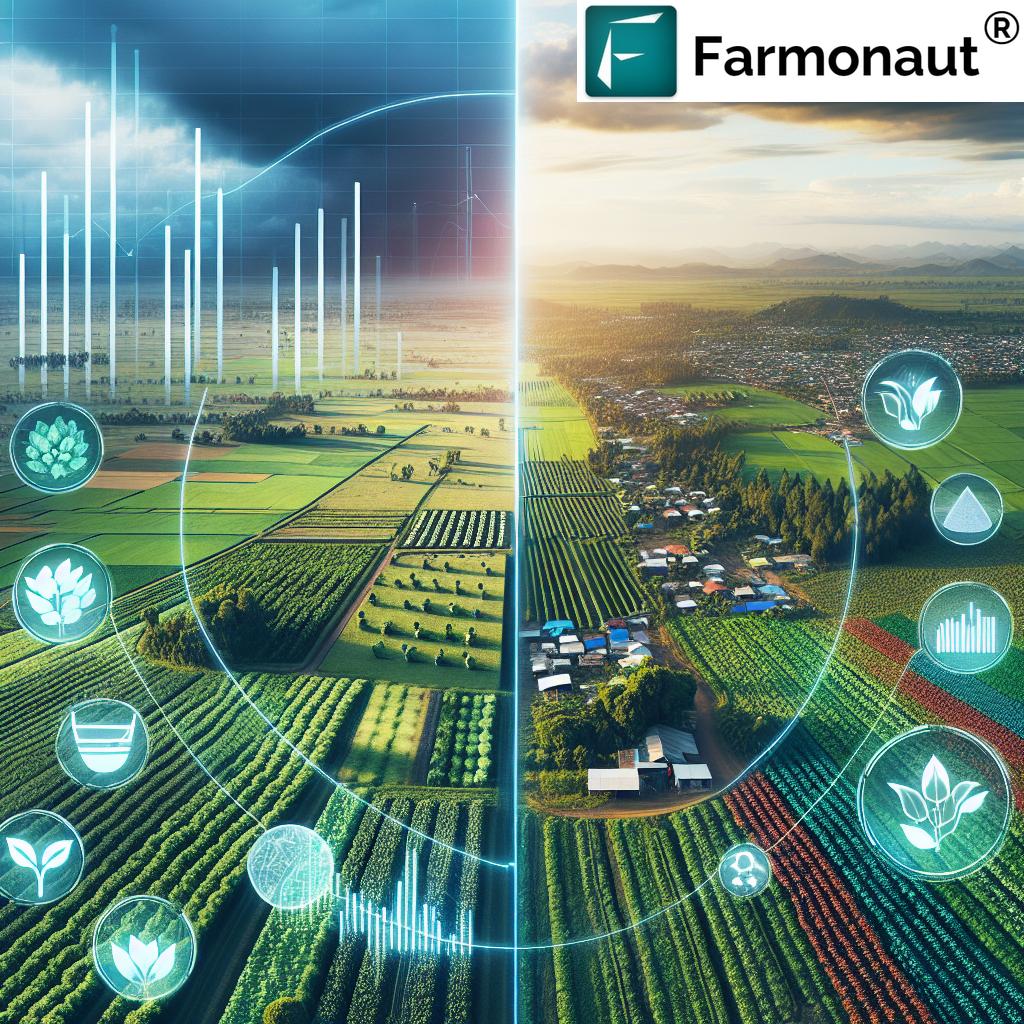Table of Contents
- Introduction: The Evolving Landscape of Agricultural Land for Sale in India 2025
- Current Trends in Agricultural Land Sale India 2025
- Key Factors Driving the Market for Agricultural Land Sale
- Legal and Regulatory Landscape for Agricultural Land for Sale in India
- Challenges Facing the Agricultural Land Sale Market
- Opportunities & Technological Innovation: The 2025 Outlook
- Key States to Watch—Comparative Table for 2025
- Sustainable Farming Practices and Land Value
- Farmonaut’s Role: Leveraging Satellite Technology for Land Decisions
- FAQ: Agricultural Land Sale India 2025
- Conclusion: The Future of Agricultural Land Transactions in India
“India’s agricultural land sales are projected to grow by 12% in 2025, driven by rising investor interest and policy reforms.”
Agricultural Land for Sale India: 2025 Market Trends, Legal Factors, and Opportunities
The landscape of agricultural land for sale in India is witnessing significant shifts in 2025, driven by evolving economic, technological, and policy dynamics. As India strives to strike a balance between rapid urbanization and sustainable farming practices, the demand for agricultural lands for sale is growing stronger than ever before.
Agricultural land stands as a crucial asset for the country’s food security and rural economy. Buying and selling agricultural land is no longer the exclusive domain of generational farmers; today, investors, agribusiness firms, and tech-driven enterprises are increasingly interested in the sector for its long-term value and strategic importance to the nation’s food systems.
In this comprehensive report, we analyze key trends, legal frameworks, investment avenues, and emerging opportunities in the agricultural land for sale india market, spotlighting states like Maharashtra, Punjab, Karnataka, and more. For anyone considering a purchase, sale, or investment in agricultural land in 2025, understanding these key factors is essential for making informed decisions.



Try Farmonaut API for satellite data insights for land records, soil monitoring, and agribusiness.
View Farmonaut API Developer Docs for integration into agricultural or real estate platforms.
Current Trends in Agricultural Land Sale India 2025
The agricultural land for sale in India market is undergoing rapid transformation. Current trends show a growing mix of buyers — from traditional farmers looking to expand their holdings to urban investors interested in appreciation and strategic agribusiness firms aiming to integrate farming into their value chains.
- Agricultural land sale remains strong in Maharashtra, Punjab, Haryana, and Karnataka, thanks to their fertile soil and robust irrigation infrastructure.
- Emerging regions in Madhya Pradesh and Telangana are gaining traction due to improved connectivity and government incentives for land acquisition and sustainable agriculture.
- There is a marked rise in contract farming and agri-tech startups; these trends have contributed to increased interest in buying agricultural land as modern farming techniques require access to better-quality land and water resources.
The fragmented nature of holdings in Indian agriculture — with most farmers owning less than 2 hectares — remains one of the primary challenges. However, market demand is pushing towards consolidation, especially among professional investors and companies interested in scaling up agricultural operations.
What’s Driving Demand for Agricultural Land Sales?
- The appreciation of land value in peri-urban regions
- Policy reforms encouraging investment and eased regulations in selected states
- Rising interest in sustainable and organic farming as a business model
- Wider access to digital records and online land transaction platforms
- Growth of corporate agribusiness seeking to integrate local agricultural chains
“Maharashtra, Uttar Pradesh, and Karnataka will account for over 40% of India’s agricultural land transactions in 2025.”
Key Factors Influencing the Agricultural Land for Sale Market
Economic Shifts and Urbanization
Rapid urbanization across India is placing new pressures on rural land. The demand for agricultural land sale in peri-urban areas has grown, partly due to infrastructure projects, new industrial corridors, and housing developments pushing land prices upward. However, government efforts are focused on striking a balance between food security and urban expansion to secure the nation’s agricultural future.
Technological Innovation
The push for modern farming practices has made access to high-quality soil, water, and efficient land management more crucial than ever. Solutions like remote sensing, AI-driven monitoring, and satellite-powered advisories (such as those provided by Farmonaut’s Large Scale Farm Management platform) help farmers, buyers, and investors make smarter buying decisions and identify valuable lands for purchase and investment.
Through Farmonaut Carbon Footprinting, users can also monitor environmental impact, supporting better valuation of land based on its sustainability metrics. Crop yield projections and soil health assessments, powered by data, are redefining how we appraise agricultural land value in India.
Policy Changes and Agricultural Incentives
Numerous state governments have introduced incentives for land consolidation, cooperative farming, and even leasing to attract diverse buyers — from tech-savvy startups to established farming families. These policy reforms are designed to address fragmented landholdings and encourage the adoption of modern farming methods, making large-scale agricultural investment more lucrative and less risky.
Legal and Regulatory Landscape for Agricultural Land for Sale in India
In India, land is a state subject as per the Constitution — meaning laws, regulations, and restrictions regarding agricultural land sales can vastly differ from state to state. Understanding these legal requirements is paramount for anyone seeking to purchase or sell agricultural land in 2025.
Ownership and Transfer: Who Can Buy Agricultural Land in India?
- Typically, only farmers or “agriculturists” deemed by state regulations are permitted to purchase agricultural land.
- In some states, non-agriculturists and corporations may acquire agricultural land under special provisions or via leasing, to encourage investment.
- There are significant variations in zoning regulations, title rights, and purchase requirements across Maharashtra, Punjab, Haryana, Karnataka, Madhya Pradesh, and Telangana.
Due diligence is critical: Prospective buyers must conduct thorough research regarding land records, titles, local zoning, and legal compliance before engaging in any transaction. This is especially important as digitalization expands—platforms digitizing records and registry processes are mitigating decades-old inefficiencies and fraud.
Some key legal aspects to consider include:
- Title Verification: Ensure the ownership chain is clear and the land is free of encumbrances.
- Occupancy Rights: Ascertain who is in actual possession of the land.
- Zoning and Land-Use Classification: Regulations regarding change of land use and compliance with master plans.
- Transfer Restrictions: Be aware of restrictions based on the status of the buyer (farmer vs. non-farmer), land ceiling acts, and any pending litigations.
- Stamp Duty & Registration: Factor in state-specific stamp duty rates and procedural requirements.
New land acquisition policies continue to evolve in 2025, aiming to simplify transfer rules while enhancing safeguards for traditional farmers and promoting equitable development.
Challenges Facing the Agricultural Land Sale Market in 2025
Fragmentation and Small Holdings
One of the primary challenges in agricultural land sale india is the historically fragmented nature of holdings. Over 86% of Indian farmers operate small or marginal plots (less than 2 hectares). This structure impacts market transactions by:
- Limiting economies of scale needed for modern, mechanized farming.
- Complicating land acquisition for large agri-businesses or investor groups.
- Creating title disputes and challenges in land records digitization.
Environmental and Resource Constraints
The value and usability of agricultural lands for sale are increasingly affected by land degradation, water scarcity, and climate variability. Soil health is a critical determinant, as erratic rainfall, depleting groundwater, and increasing soil erosion are leading buyers to prioritize:
- Regions with strong irrigation infrastructure
- Soil with high organic content and carbon profile
- Land with verified environmental records and sustainable water resources
Title Disputes and Record Errors
Legacy issues with land titles, improper digitization of records, and inefficient registry systems sometimes lead to litigation and block smooth transactions. While initiatives like the Digital India Land Records Modernization Programme (DILRMP) are making progress, buyers must still conduct thorough due diligence.
Changing Buyer Requirements
- Buyers increasingly require parcels suitable for smart farming, with precision irrigation and infrastructure access.
- Large institutional investors, family offices, and rural collectives are interested in consolidated or contiguous lands, not fragmented plots.
Emerging Opportunities & Technological Innovation: The Agricultural Land for Sale India 2025 Outlook
Digitalization of Land Records and Smart Decision-Making
Gradual digitalization — supported by advanced AI, blockchain, and satellite analytics — is streamlining the buying and sale process. As more land records go online, transparency increases, fraud is minimized, and both institutional and individual buyers find it easier to evaluate acquisition opportunities.
- Instant access to satellite imagery (such as via Farmonaut’s mobile and web apps) provides crucial information on a parcel’s vegetation health, soil quality, and land use patterns at the time of sale.
- Blockchain-based traceability promotes trust in the agricultural value chain, offering transparent records of land usage, input provenance, and export compliance for buyers, lenders, and regulatory bodies.
Modern Investment Vehicles
Agricultural land in India is increasingly part of diversified investment portfolios. Institutional investors, agri-focused funds, and even REIT-style trusts are taking exposure to the sector, especially for lands suitable for premium-value crops, regenerative farming, and organic produce.
- Buyers are also looking to expand into industries like carbon credit farming, contract plantations, and integrated supply chains.
- Farmonaut’s crop loan and insurance verification tools (leveraging satellite monitoring) help lenders and land buyers assess creditworthiness and reduce risk.
The bottom line: As the value and utility of agricultural land for sale in India is increasingly tied to sustainability and technology, those leveraging smart analytics and resource management tools are well-positioned for higher ROI in the long run.
Key States to Watch — 2025 Agricultural Land Market Trends by State
The following comparative table provides an at-a-glance view of the evolving agricultural land for sale india market across major states. It details average land prices per acre, YoY price change, legal nuances, investment opportunities, and the sustainability index for 2025.
| State | Est. Avg. Price/ Acre (INR, 2025) |
YoY Price Change (%) | Legal Considerations | Demand Trend | Inv. Opportunities | Sustainable Initiatives |
|---|---|---|---|---|---|---|
| Punjab | ₹48–54 lakh | +11.0 | Strict farmer-only purchase, occasional relaxations for FDI in food processing | Rising | Organic wheat, contract farming, food processing exports | Soil monitoring, water conservation, precision irrigation |
| Maharashtra | ₹29–37 lakh | +12.5 | Non-farmers can buy with restrictions, compliance checks crucial | Rising | Horticulture, vineyards, warehouse/agribusiness parks | Water-efficient tech, carbon farming pilots |
| Karnataka | ₹21–28 lakh | +9.6 | Laws eased for non-agriculturists recently | Rising | Millet clusters, integrated processing, agri-tech startups | Organic, precision agriculture zones |
| Andhra Pradesh | ₹17–23 lakh | +8.8 | Stringent on non-farmer purchases; special SEZ permissions | Stable | Aqua-farming, coastal crops, floriculture | Drip irrigation incentives, coastal conservation |
| Uttar Pradesh | ₹26–32 lakh | +10.7 | Purchase by farmers; joint ventures regulated | Rising | Sugar cane, greenhouses, food parks | Land consolidation, rainwater harvesting |
| Tamil Nadu | ₹18–24 lakh | +7.9 | Purchase restricted to agriculturists, some relaxations for corporations | Stable | Vegetable clusters, export crops, agri-food processing | Organic farming, reforestation |
| Madhya Pradesh | ₹15–19 lakh | +8.1 | Flexible leasing rules; improvement in digital records | Rising | Soybean, oilseeds, contract farming | Precision ag, blockchain traceability pilots |
| Telangana | ₹14–18 lakh | +8.6 | Record modernization, focus on sustainable districts | Rising | Seed R&D, organic, smart farms | Soil testing, digital farm mapping |
Note: Values are 2025 estimates based on industry reports and official policy updates. Due diligence is essential prior to actual land transactions.
Sustainable Farming Practices and Their Impact on Land Value
Sustainability is now a key component in agricultural land appraisal and investment. Lands with high soil organic carbon, efficient irrigation systems, and low environmental impact are fetching premiums over conventional plots. Both domestic buyers and overseas investors are increasingly interested in regenerative, climate-smart agriculture opportunities.
- Market trends indicate sustainable land with robust digital records and established conservation practices are more resilient to price shocks and climate risks.
- Advanced resource management (such as satellite fleet tracking and resource management) contribute to higher productivity and enhanced land value over time.
- The growth in soil and carbon monitoring tools drives up demand for “premium” land parcels suited to sustainable farming.
Additionally, government incentives to promote organic and precision farming (such as crop plantation and forest advisory services) facilitate more sustainable and profitable land utilization in 2025.
How Farmonaut Empowers Land Buyers, Investors, and Farmers
We at Farmonaut empower land buyers, farmers, and investors with actionable insights using advanced satellite-based monitoring, AI-powered advisory, and blockchain traceability. Our ecosystem supports agricultural land sale decisions by:
- Satellite-Based Monitoring: Real-time analysis of soil health, water resources, and land use patterns across regions like Punjab, Maharashtra, Karnataka, Madhya Pradesh, and more. This ensures that buyers assess land value and sustainability factors with confidence.
- AI Advisory (Jeevn AI): Delivers data-backed recommendations for optimal crop selection, irrigation, and risk mitigation directly on web/mobile apps.
- Blockchain Traceability: Our system enhances transparency for all stakeholders by tracking the history and usage of agricultural lands, mitigating fraudulent transactions.
- Environmental Impact Tracking: Farmonaut’s carbon monitoring and resource management solutions offer tangible data for those seeking sustainable land investment, satisfying regulatory compliance and unlocking access to green funds.
- Access to Financing: Our API and monitoring systems enable accurate satellite-based land and crop verification for loan and insurance processing, reducing risk for both land buyers and financial institutions.
To get started with Farmonaut, simply choose a subscription suited for individual farmers, real estate professionals, or institutional investors, also available via the API.
FAQ: Agricultural Land for Sale in India — 2025 Market & Legal Queries
1. Who can legally purchase agricultural land for sale in India in 2025?
In most states, only registered farmers (“agriculturists”) can legally purchase agricultural land. However, states like Karnataka and Maharashtra have eased some restrictions, permitting non-agriculturists to buy under specific conditions. Corporations may also acquire agricultural land for permitted industrial or agri-related use, subject to state rules.
2. What trends are increasing the value of agricultural land for sale in India?
Land with high soil quality, sustainable water resources, and modern infrastructure is in rising demand. Investment trends show increased interest in regions implementing sustainable practices, carbon farming, and digital land records management, with peri-urban areas seeing rapid appreciation.
3. How can I verify agricultural land records and soil health before purchase?
Buyers should use both official government digital records and secondary tools, such as satellite imagery and AI-powered monitoring (available via apps like Farmonaut), for real-time land mapping, soil condition reports, and carbon profiling.
4. Does Farmonaut assist in buying or selling agricultural land?
No, Farmonaut does not function as a marketplace or intermediary in land transactions. Our core value is providing real-time satellite insights, environmental impact analysis, and record verification tools that empower users in their due diligence for agricultural land sale india.
5. Are there any government incentives for sustainable or organic farming in 2025?
Yes. Many state governments offer incentives, including tax breaks, infrastructure support, and preferential lending for sustainable, organic, and precision farming ventures. Buyers should explore region-specific schemes when investing in agricultural land.
6. Why is the agricultural land sale market shifting so rapidly in 2025?
The main drivers are policy reforms (making ownership easier), the rise of tech-enabled farming, institutional investments, and greater demand for sustainable, export-quality produce—propelled by both domestic and global supply chains.
Conclusion: Agricultural Land Sale in India 2025 — A Dynamic, Data-Driven Decade Ahead
The 2025 era for agricultural land for sale in India is characterized by a dynamic interplay of tradition and innovation. While regulatory complexities and environmental challenges persist, bold steps in technology adoption, digital records, and sustainable farming practices are setting new standards for transparency and value realization.
For buyers, investors, and farmers, success in the agricultural land sale india market now depends on staying informed about legal frameworks, market trends, and leveraging advanced decision-making tools. We at Farmonaut are committed to supporting this transformation by delivering tools and insights for sustainable and profitable land acquisition.
As India strives for food security, rural prosperity, and climate resilience, agricultural land will remain a cornerstone of its economic narrative—shaped by evolving buyer profiles, tech-enabled due diligence, and a renewed drive for sustainable agricultural practices. Now, more than ever, a well-informed approach is key to securing long-term value in India’s agricultural land market.









